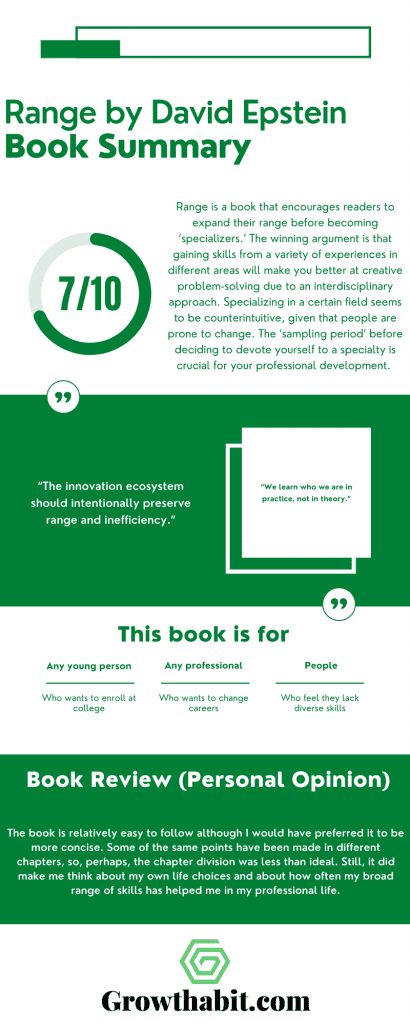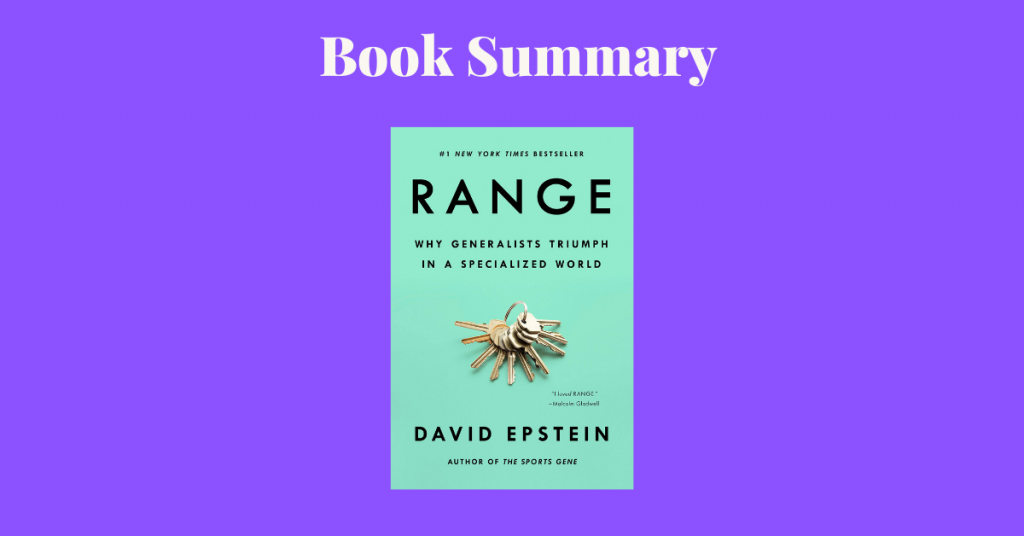Range is a book that encourages readers to expand their range before becoming ‘specializers.’ The winning argument is that gaining skills from a variety of experiences in different areas will make you better at creative problem-solving due to an interdisciplinary approach.
Specializing in a certain field seems to be counterintuitive, given that people are prone to change. The ‘sampling period’ before deciding to devote yourself to a specialty is crucial for your professional development.
Book Title: Range: Why Generalists Triumph in a Specialized World
Author: David Epstein
Date of Reading: December 2021
Rating: 7/10
What Is Being Said In Detail:
Everybody has a different life journey, so before delving into a chosen specialty, you should remember to experience the ‘sampling period.’ It will help you develop broader skills that you can use across different disciplines. The book highlights deep learning, analogical thinking, and creativity.
The Cult of the Head Start
Chapter 1 dispels the myth about developing skills through experience in fields that do not include patterns of repetition. Moreover, it distinguishes between areas in which a broad experience is preferable to a narrow one.
For instance, if you are a top scientist, you are highly likely to take part in activities outside your field of expertise, such as acting or dancing.
How the Wicked World Was Made
Chapter 2 focuses on people’s abilities to make connections between different ideas, concepts, or disciplines. In fact, research has shown that children who live in today’s modern world have greater success at formulating rules and finding patterns without being given methods and instructions.
When Less of the Same is More
Chapter 3 emphasizes the importance of the so-called “sampling period.” It means that before you decide on your specialty, you should try your hand at different ones.
Take musical instruments, for example. Instead of picking one straight away and sticking with it, try learning how to play a few of them, and then focus on the one you like the most.
Learning, Fast and Slow
Chapter 4 introduces an unpopular, but completely valid idea that the “best learning road is slow.” If your learning process is extremely fast, you risk forgetting crucial information when you need it the most. Deep learning is long-lasting and can be used across a variety of disciplines.
Thinking Outside Experience
Chapter 5 sheds light on deep analogical thinking. When you are able to draw parallels between seemingly unconnected disciplines, you employ analogical thinking.
On one hand, it means that you can take a familiar idea or a concept and approach it from different, new angels. On the other hand, you can take a new idea and put it in a familiar framework. Analogical thinking connects dots that might seem invisible at first.
The Trouble with Too Much Grit
Chapter 6 talks about knowing when to quit. If you find a certain field difficult, it doesn’t mean that the right step is to quit. You will face obstacles throughout your life, so you should persevere through hardships.
However, if you feel that you still need to explore your abilities and interests in a broader sense, it’s best to switch to another field to “sample” it.
Flirting with Your Possible Selves
Chapter 7 reveals one of the greatest truths about all of us: “We are works in progress claiming to be finished.” Therefore, it’s hard to make long-term goals because our desires, interests, motivations, and personalities continuously change.
Don’t be afraid to make a change simply because you had your whole future planned when you were younger. Be open and accept that your life path might turn out to be unusual, but full of novel experiences.
The Outside Advantage
Chapter 8 indicates that people who are specialists in a very narrow field might fail to find a solution to a problem that requires broader thinking and an interdisciplinary approach.
Sometimes your path can be so specialized and narrow, that you might need to take a step back to be able to see the forest for the trees.
Lateral Thinking with Withered Advantage
Chapter 9 explores the concept of “withered technology” using the example of the Game Boy, which was created by Yokoi. If you manage to find new uses for old technology, it means that you have the “withered advantage.”
You can manifest your creativity by finding novel ways to use cheap and simple technology that many others have found to be either obsolete or boring.
Fooled by Expertise
Chapter 10 identifies the flaws in feeling confident in one’s expertise. Experts often refuse to admit that they can make an error in judgment when it comes to forecasting specific events. The greatest forecasters do not impose their ideas on other experts, but rather invite them to test hypotheses.
Learning to Drop Your Familiar Tools
Chapter 11 encourages the readers to stop relying completely on ‘overlearned behavior.’ All of us use familiar tools in our professional endeavors, however, this familiarity might prove to be an obstacle to our progress, rather than a driving force. Therefore, when certain situations require it, be prepared to ‘drop your familiar tools.’
Deliberate Amateurs
Chapter 12 inspires people to embrace change. When you are on the road to accomplishing a certain goal, you will be faced with obstacles and distractions.
Sometimes spending time on distractions may prove to be the most beneficial thing to do to reach your goal. Try to develop an interdisciplinary way of thinking because it will foster creativity to find solutions to problems in unconventional ways.
Most Important Keywords, Sentences, Quotes:
INTRODUCTION – Roger vs. Tyger
“Tiger was not merely playing golf. He was engaging in ‘deliberate practice,’ the only kind that counts in the now-ubiquitous ten thousand-hours rule to expertise.
The ‘rule’ represents the idea that the number of accumulated hours of highly specialized training is the sole factor in skill development, no matter the domain.”
“The professed necessity of hyperspecialization forms the core of a vast, successful, and sometimes well-meaning marketing machine, in sports and beyond. In reality, the Roger path to sports stardom is far more prevalent than the Tiger path, but those athletes’ stories are much more quietly told, if they are told at all.”
“We know that early sampling is key, as is diversity.”
“I was stunned when cognitive psychologists I spoke with led me to an enormous and too often ignored body of work demonstrating that learning itself is best done slowly to accumulate lasting knowledge, even when that means performing poorly on tests of immediate progress.”
“The challenge we all face is how to maintain the benefits of breadth, diverse experience, interdisciplinary thinking, and delayed concentration in a world that increasingly incentivizes, even demands, hyperspecialization.”
CHAPTER 1 – The Cult of the Head Start
“Whether or not experience inevitably led to expertise depended entirely on the domain in question. Narrow experience made for better chess and poker players and firefighters, but not for better predictors of financial or political trends, or of how employees or patients would perform.”
“The learning environment is kind because a learner improves simply by engaging in the activity and trying to do better. Kahneman was focused on the flip side of kind learning environments; Hogarth called them “wicked.”
In wicked domains, the rules of the game are often unclear or incomplete, there may or may not be repetitive patterns and they may not be obvious, and feedback is often delayed, inaccurate, or both.”
“Chunking helps explain instances of apparently miraculous, domain-specific memory, from musicians playing long pieces by heart to quarterbacks recognizing patterns of players in a split second and making a decision to throw.
The reason that elite athletes seem to have superhuman reflexes is that they recognize patterns of ball or body movements that tell them what’s coming before it happens.
When tested outside of their sport context, their superhuman reactions disappear. We all rely on chunking every day in skills in which we are expert.”
“Patterns and familiar structures were critical to the savant’s extraordinary recall ability. Similarly, when artistic savants are briefly shown pictures and asked to reproduce them, they do much better with images of real-life objects than with more abstract depictions.”
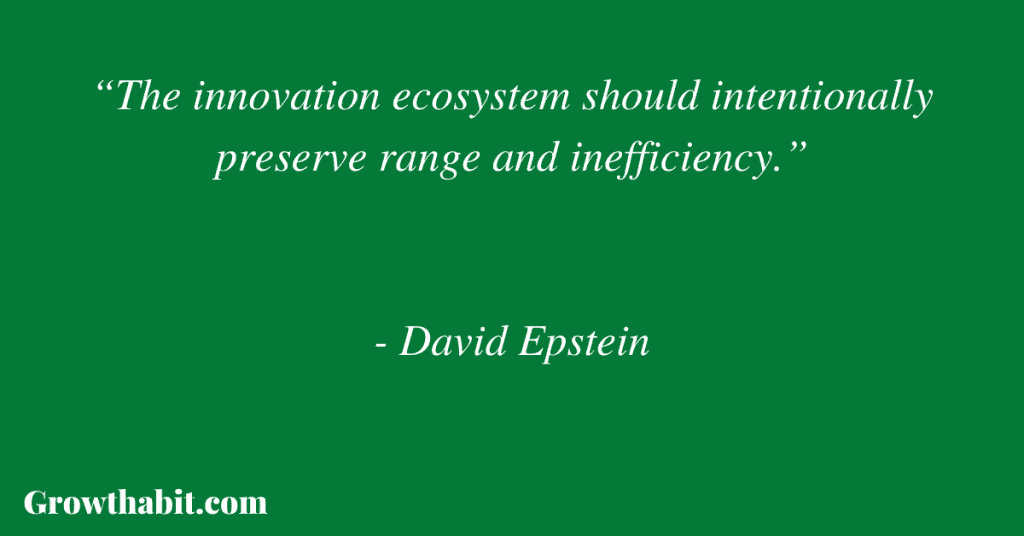
“There are domains beyond chess in which massive amounts of narrow practice make for grandmaster-like intuition. Like golfers, surgeons improve with the repetition of the same procedure.
Accountants and bridge and poker players develop accurate intuition through repetitive experience. Kahneman pointed to those domains’ “robust statistical regularities.” But when the rules are altered just slightly, it makes experts appear to have traded flexibility for narrow skill.”
“Scientists inducted into the highest national academies are much more likely to have avocations outside of their vocation. And those who have won the Nobel Prize are more likely still.
Compared to other scientists, Nobel laureates are at least twenty-two times more likely to partake as an amateur actor, dancer, magician, or other type of performer.”
CHAPTER 2 – How the Wicked World Was Made
“In Flynn’s terms, we now see the world through ‘scientific spectacles.’ He means that rather than relying on our own direct experiences, we make sense of reality through classification schemes, using layers of abstract concepts to understand how pieces of information relate to one another.
We have grown up in a world of classification schemes totally foreign to the remote villagers; we classify some animals as mammals, and inside of that class make more detailed connections based on the similarity of their physiology and DNA.”
“Research on thousands of adults in six industrializing nations found that exposure to modern work with self-directed problem solving and nonrepetitive challenges was correlated with being “cognitively flexible.”
As Flynn makes sure to point out, this does not mean that brains now have more inherent potential than a generation ago, but rather that utilitarian spectacles have been swapped for spectacles through which the world is classified by concepts.”
“Exposure to the modern world has made us better adapted for complexity, and that has manifested as flexibility, with profound implications for the breadth of our intellectual world.
In every cognitive direction, the minds of premodern citizens were severely constrained by the concrete world before them.”
“It is certainly true that modern life requires range, making connections across far-flung domains and ideas. Luria addressed this kind of ‘categorical’ thinking, which Flynn would later style as scientific spectacles.”
“Everyone needs habits of mind that allow them to dance across disciplines.”
CHAPTER 3 – When Less of the Same is More
“The Pietà’s music program was not unique for its rigor. According to a list of Pietà directives, formal lessons were Tuesdays, Thursdays, and Saturdays, and figlie were free to practice on their own.
Early in the rise of the figlie del coro, work and chores took most of their time, so they were only allowed an hour a day of music study. The most surprising feature was how many instruments they learned.”
“The Pieta’s musicians loved to show off their versatility. According to a French writer, they were trained ‘in all styles of music, sacred or profane,’ and gave concerts that ‘lent themselves to the most varied vocal and instrumental combinations.’
Audience members commonly remarked on the wide range of instruments the figlie could play, or on their surprise at seeing a virtuosa singer come out during intermission to improvise an instrumental solo.”
“A study of music students aged eight to eighteen and ranging in skill from rank novices to students in a highly selective music school found that when they began training there was no difference in the amount of practice undertaken between any of the groups of players, from the least to the most accomplished.
The students who would go on to be most successful only started practicing much more once they identified an instrument they wanted to focus on, whether because they were better at it or just liked it more. The instrument, it appeared, was driving the practitioner, rather than the reverse.”
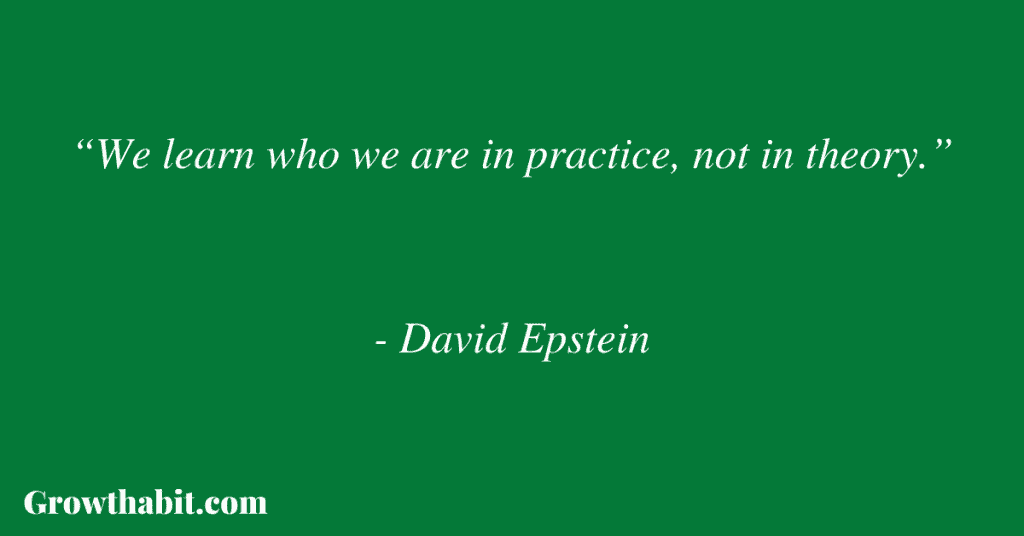
“The distribution of effort across different instruments seems important. Those children identified as exceptional by [the school] turn out to be those children who distributed their effort more evenly across three instruments.”
“The psychologists highlighted the variety of paths to excellence, but the most common was a sampling period, often lightly structured with some lessons and a breadth of instruments and activities, followed only later by a narrowing of focus, increased structure, and an explosion of practice volume.”
“Improv masters learn like babies: dive in and imitate and improvise first, learn the formal rules later.”
CHAPTER 4 – Learning, Fast and Slow
“We’re very good, humans are, at trying to do the least amount of work that we have to in order to accomplish a task, Richland told me. Soliciting hints toward a solution is both clever and expedient. The problem is that when it comes to learning concepts that can be broadly wielded, expedience can backfire.”
“If the teacher didn’t already turn the work into using-procedures practice, well-meaning parents will. They aren’t comfortable with bewildered kids, and they want understanding to come quickly and easily. But for learning that is both durable (it sticks) and flexible (it can be applied broadly), fast and easy is precisely the problem.”
“Struggling to retrieve information primes the brain for subsequent learning, even when the retrieval itself is unsuccessful. The struggle is real, and really useful. ‘Like life,’ Kornell and team wrote, ‘retrieval is all about the journey.’”
“It isn’t bad to get an answer right while studying. Progress just should not happen too quickly, unless the learner wants to end up like Oberon (or, worse, Macduff), with a knowledge mirage that evaporates when it matters most.
As with excessive hint-giving, it will, as a group of psychologists put it, ‘produce misleadingly high levels of immediate mastery that will not survive the passage of substantial periods of time.’”
“It is difficult to accept that the best learning road is slow, and that doing poorly now is essential for better performance later. It is so deeply counterintuitive that it fools the learners themselves, both about their own progress and their teachers’ skill.”
“Whether chemists, physicists, or political scientists, the most successful problem solvers spend mental energy figuring out what type of problem they are facing before matching a strategy to it, rather than jumping in with memorized procedures.
In that way, they are just about the precise opposite of experts who develop in kind learning environments, like chess masters, who rely heavily on intuition.”
CHAPTER 5 – Thinking Outside Experience
“Kepler’s intellectual wanderings traced a staggering journey, from planets imbued with souls and riding on interlocking crystalline spheres in perfect circles around the stationary Earth, to his illumination of the laws of planetary motion, which showed that the planets move in ellipses that are predictable based on their relation to the sun.
More important, Kepler invented astrophysics. He did not inherit an idea of universal physical forces.”
“In an age when alchemy was still a common approach to natural phenomena, Kepler filled the universe with invisible forces acting all around us, and helped usher in the Scientific Revolution.
His fastidious documentation of every meandering path his brain blazed is one of the great records of a mind undergoing creative transformation. It is a truism to say that Kepler thought outside the box. But what he really did, whenever he was stuck, was to think entirely outside the domain.”
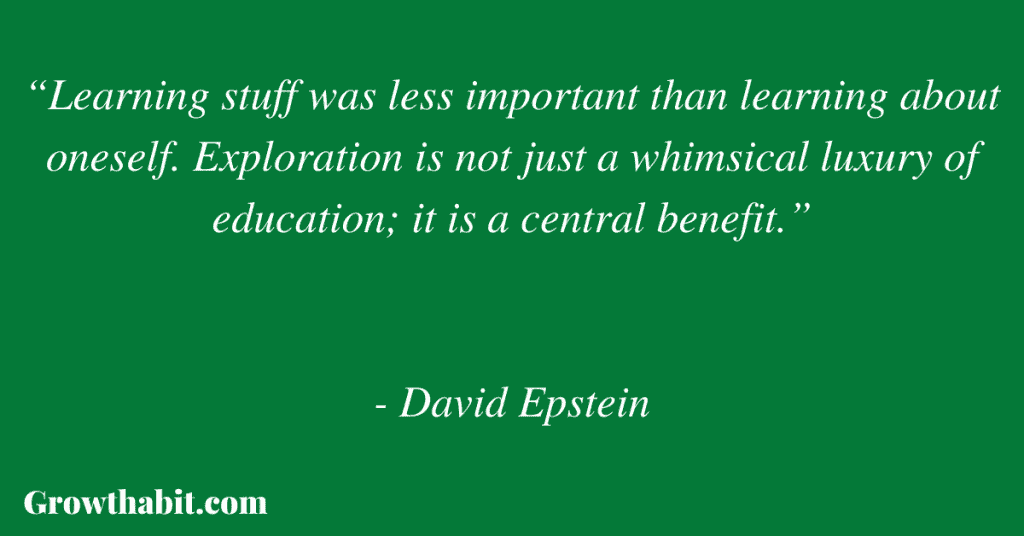
“Deep analogical thinking is the practice of recognizing conceptual similarities in multiple domains or scenarios that may seem to have little in common on the surface. It is a powerful tool for solving wicked problems.”
“Analogical thinking takes the new and makes it familiar, or takes the familiar and puts it in a new light, and allows humans to reason through problems they have never seen in unfamiliar contexts. It also allows us to understand that which we cannot see at all.”
“Human intuition, it appears, is not very well engineered to make use of the best tools when faced with what the researchers called “illdefined” problems.
Our experience-based instincts are set up well for Tiger domains, the kind world Gentner described, where problems and solutions repeat.”
“Psychologists have shown repeatedly that the more internal details an individual can be made to consider, the more extreme their judgment becomes.”
CHAPTER 6 – The Trouble with Too Much Grit
“Van Gogh’s paintings served as a bridge to modern art and inspired a widespread devotion that no artist, perhaps no person, has equaled.”
“It would be easy enough to cherry-pick stories of exceptional late developers overcoming the odds. But they aren’t exceptions by virtue of their late starts, and those late starts did not stack the odds against them. Their late starts were integral to their eventual success.”
“In each country, every college course that a student took provided skills that could be applied in a specific field, as well as information about their match quality with the field itself. If students focused earlier, they compiled more skills that prepared them for gainful employment.
If they sampled and focused later, they entered the job market with fewer domain-specific skills, but a greater sense of the type of work that fit their abilities and inclinations.”
“Switchers are winners. It seems to fly in the face of hoary adages about quitting, and of far newer concepts in modern psychology.”
“We fail when we stick with “tasks we don’t have the guts to quit. Godin clearly did not advocate quitting simply because a pursuit is difficult.
Persevering through difficulty is a competitive advantage for any traveler of a long road, but he suggested that knowing when to quit is such a big strategic advantage that every single person, before undertaking an endeavor, should enumerate conditions under which they should quit.”
CHAPTER 7 – Flirting with Your Possible Selves
“Obviously, there’s nothing wrong with getting a law or medical degree or PhD. But it’s actually riskier to make that commitment before you know how it fits you. And don’t consider the path fixed. People realize things about themselves halfway through medical school.”
“Career goals that once felt safe and certain can appear ludicrous, to use Darwin’s adjective, when examined in the light of more selfknowledge. Our work preferences and our life preferences do not stay the same, because we do not stay the same.”
“Psychologist Dan Gilbert called it the ‘end of history illusion.’ From teenagers to senior citizens, we recognize that our desires and motivations sure changed a lot in the past (see: your old hairstyle), but believe they will not change much in the future. In Gilbert’s terms, we are works in progress claiming to be finished.”
“It is definitely true that a shy child is more likely to foreshadow a shy adult, but it is far from a perfect correlation. And if one particular personality trait does not change, others will. The only certainty is change.”
“Because personality changes more than we expect with time, experience, and different contexts, we are ill-equipped to make ironclad long-term goals when our past consists of little time, few experiences, and a narrow range of contexts.”
“My favorite fiction writers might be darker dark horses still. Haruki Murakami wanted to be a musician, ‘but I couldn’t play the instruments very well,’ he said.
He was twenty-nine and running a jazz bar in Tokyo when he went to a spring baseball game and the crack of the bat—“a beautiful, ringing double,” Murakami wrote— gave him the revelation that he could write a novel.”
CHAPTER 8 – The Outside Advantage
“The trick: to frame the challenge so that it attracted a diverse array of solvers. The more likely a challenge was to appeal not just to scientists but also to attorneys and dentists and mechanics, the more likely it was to be solved.”
“We tend to view things with all the information we’ve gathered in our industry, and sometimes that puts us down a path that goes into a wall. It’s hard to back up and find another path.”
“Swanson wanted to show that areas of specialist literature that never normally overlapped were rife with hidden interdisciplinary treasures waiting to be connected.
He created a computer system, Arrowsmith, that helped other users do what he did—devise searches that might turn up distant but relevant sets of scientific articles, and ignited a field of information science that grapples with connecting diverse areas of knowledge, as specialties that can inform one another drift apart.”
“It isn’t just the increase in new knowledge that generates opportunities for nonspecialists, though. In a race to the forefront, a lot of useful knowledge is simply left behind to molder.
That presents another kind of opportunity for those who want to create and invent but who cannot or simply do not want to work at the cutting edge. They can push forward by looking back; they can excavate old knowledge but wield it in a new way.”
CHAPTER 9 – Lateral Thinking with Withered Advantage
“By ‘withered technology,’ Yokoi meant tech that was old enough to be extremely well understood and easily available, so it didn’t require a specialist’s knowledge.
The heart of his philosophy was putting cheap, simple technology to use in ways no one else considered. If he could not think more deeply about new technologies, he decided, he would think more broadly about old ones. He intentionally retreated from the cutting edge, and set to monozukuri.”
“What its withered technology lacked, the Game Boy made up in user experience. It was cheap. It could fit in a large pocket. It was all but indestructible. If a drop cracked the screen—and it had to be a horrific drop—it kept on ticking.”
“Yokoi’s strategy of finding novel uses for technology, after others had moved on, smacks of exactly what a well-known psychological creativity exercise asks for.”
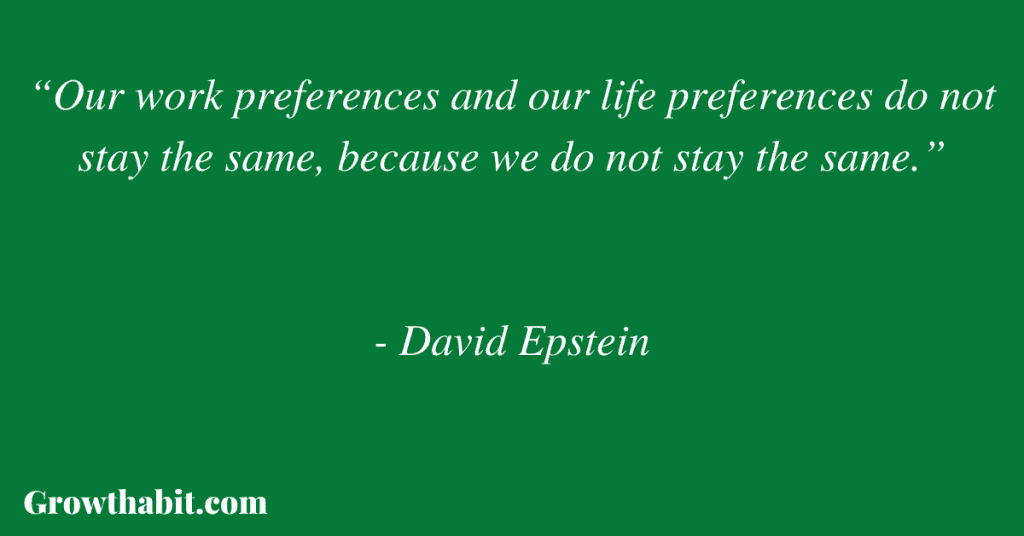
“Yokoi’s greatest triumphs occurred when he thought laterally. He needed specialists, but his concern was that as companies grew and technology progressed, vertical-thinking hyperspecialists would continue to be valued but lateral-thinking generalists would not.”
“Eminent physicist and mathematician Freeman Dyson styled it this way: we need both focused frogs and visionary birds. ‘Birds fly high in the air and survey broad vistas of mathematics out to the far horizon,’ Dyson wrote in 2009. ‘
They delight in concepts that unify our thinking and bring together diverse problems from different parts of the landscape. Frogs live in the mud below and see only the flowers that grow nearby. They delight in the details of particular objects, and they solve problems one at a time.’”
“Darwin always juggled multiple projects, what Gruber called his “network of enterprise.” He had at least 231 scientific pen pals who can be grouped roughly into thirteen broad themes based on his interests, from worms to human sexual selection.
He peppered them with questions. He cut up their letters to paste pieces of information in his own notebooks, in which “ideas tumble over each other in a seemingly chaotic fashion.” When his chaotic notebooks became too unwieldy, he tore pages out and filed them by themes of inquiry.”
CHAPTER 10 – Fooled by Expertise
“There is a particular kind of thinker, one who becomes more entrenched in their single big idea about how the world works even in the face of contrary facts, whose predictions become worse, not better, as they amass information for their mental representation of the world.
They are on television and in the news every day, making worse and worse predictions while claiming victory, and they have been rigorously studied.”
“When experts declared that some future event was impossible or nearly impossible, it nonetheless occurred 15 percent of the time. When they declared a sure thing, it failed to transpire more than one-quarter of the time.
Dilettantes who were pitted against the experts were no more clairvoyant, but at least they were less likely to call future events either impossible or sure things, leaving them with fewer laugh-out-loud errors to atone for—if, that was, the experts had believed in atonement.”
“Many experts never admitted systematic flaws in their judgment, even in the face of their results. When they succeeded, it was completely on their own merits—their expertise clearly enabled them to figure out the world. When they missed wildly, it was always a near miss.”
“Not only were the best forecasters foxy as individuals, they had qualities that made them particularly effective collaborators— partners in sharing information and discussing predictions.”
“It might seem like the complexity of predicting geopolitical and economic events would necessitate a group of narrow specialists, each bringing to the team extreme depth in one area.
But it was actually the opposite. As with comic book creators and inventors patenting new technologies, in the face of uncertainty, individual breadth was critical.
The foxiest forecasters were impressive alone, but together they exemplified the most lofty ideal of teams: they became more than the sum of their parts. A lot more.”
“The best forecasters view their own ideas as hypotheses in need of testing. Their aim is not to convince their teammates of their own expertise, but to encourage their teammates to help them falsify their own notions.”
CHAPTER 11 – Learning to Drop Your Familiar Tools
“Dropping familiar tools is particularly difficult for experienced professionals who rely on what Weick called ‘overlearned behavior.’
That is, they have done the same thing in response to the same challenges over and over until the behavior has become so automatic that they no longer even recognize it as a situation-specific tool.
Research on aviation accidents, for example, found that “a common pattern was the crew’s decision to continue with their original plan” even when conditions changed dramatically.”
“The researcher who led that work went on to study thousands of businesses. She found that the most effective leaders and organizations had range; they were, in effect, paradoxical.
They could be demanding and nurturing, orderly and entrepreneurial, even hierarchical and individualistic all at once. A level of ambiguity, it seemed, was not harmful.
In decision making, it can broaden an organization’s toolbox in a way that is uniquely valuable.”
“Business school students are widely taught to believe the congruence model, that a good manager can always align every element of work into a culture where all influences are mutually reinforcing—whether toward cohesion or individualism.
But cultures can actually be too internally consistent. With incongruence, ‘you’re building in cross-checks,’ Tetlock told me.
The experiments showed that an effective problem-solving culture was one that balanced standard practice—whatever it happened to be—with forces that pushed in the opposite direction.”
“Even now, even in endeavors that engender specialization unprecedented in history, there are beacons of breadth. Individuals who live by historian Arnold Toynbee’s words that ‘no tool is omnicompetent. There is no such thing as a master-key that will unlock all doors.’”
CHAPTER 12 – Deliberate Amateurs
“An enthusiastic, even childish, playful streak is a recurring theme in research on creative thinkers.”
“The word “amateur,” she pointed out, did not originate as an insult, but comes from the Latin word for a person who adores a particular endeavor.
‘A paradox of innovation and mastery is that breakthroughs often occur when you start down a road, but wander off for a ways and pretend as if you have just begun.’”
“When Geim was asked (two years before the Nobel) to describe his research style for a science newsletter, he offered this: ‘It is rather unusual, I have to say. I do not dig deep—I graze shallow.
So ever since I was a postdoc, I would go into a different subject every five years or so. . . . I don’t want to carry on studying the same thing from cradle to grave.’”
“Like Van Gogh or Frances Hesselbein or hordes of young athletes, Novoselov probably looked from the outside like he was behind, until all of a sudden he very much wasn’t. He was lucky.
He arrived in a workspace that treated mental meandering as a competitive advantage, not a pest to be exterminated in the name of efficiency.”
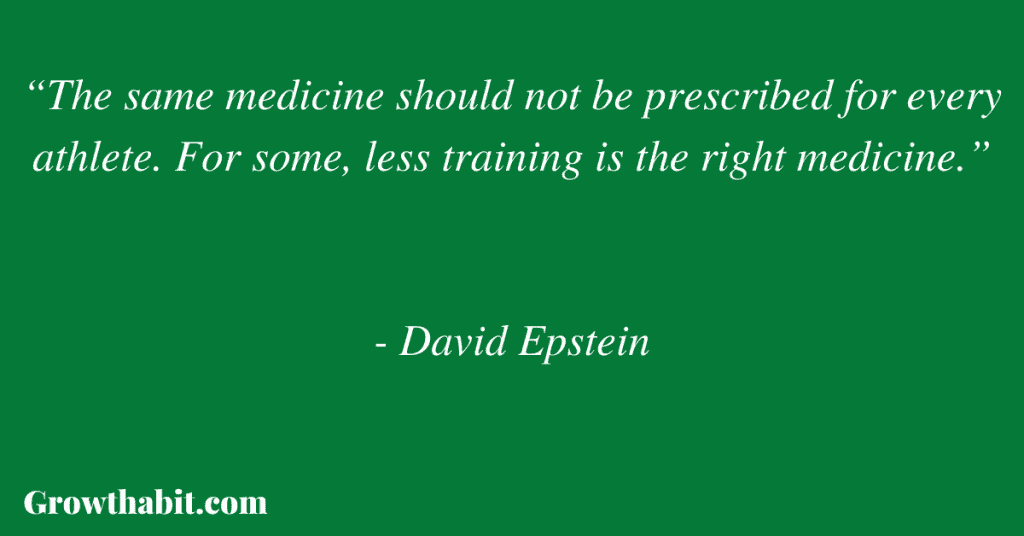
“‘If you write an interdisciplinary grant proposal, it goes to people who are really, really specialized in A or B, and maybe if you’re lucky they have the capacity to see the connections at the interface of A and B,’ he told me. ‘Everyone acknowledges that great progress is made at the interface, but who is there to defend the interface?’”
“New collaborations allow creators ‘to take ideas that are conventions in one area and bring them into a new area, where they’re suddenly seen as invention,’ said sociologist Brian Uzzi, Amaral’s collaborator. Human creativity, he said, is basically an ‘import/export business of ideas.’”
“The innovation ecosystem should intentionally preserve range and inefficiency.”
CONCLUSION – Expanding Your Range
“Creativity researcher Dean Keith Simonton has shown that the more work eminent creators produced, the more duds they churned out, and the higher their chances of a supernova success.”
“Compare yourself to yourself yesterday, not to younger people who aren’t you. Everyone progresses at a different rate, so don’t let anyone else make you feel behind. You probably don’t even know where exactly you’re going, so feeling behind doesn’t help.”
“Approach your own personal voyage and projects like Michelangelo approached a block of marble, willing to learn and adjust as you go, and even to abandon a previous goal and change directions entirely should the need arise.”
Book Review (Personal Opinion):
The book is relatively easy to follow although I would have preferred it to be more concise. Some of the same points have been made in different chapters, so, perhaps, the chapter division was less than ideal.
Still, it did make me think about my own life choices and about how often my broad range of skills has helped me in my professional life.
Rating: 7/10
This Book Is For:
- Any young person who wants to enroll at college
- Any professional who wants to change careers
- People who feel they lack diverse skills
If You Want To Learn More
Here’s David Epstein having a TED talk on his book
Why specializing early doesn’t always mean career success
How I’ve Implemented The Ideas From The Book
I try to have as many diverse experiences as possible before making a big decision, finding a solution to a problem, or setting short-term goals. Also, this book has helped me accept that change occurs much more frequently than I’ve realized, and in ways that are not always easily noticeable.
One Small Actionable Step You Can Do
Do a sampling period before making a big career decision. It will help you learn more about yourself in terms of abilities, desires, and goals.
